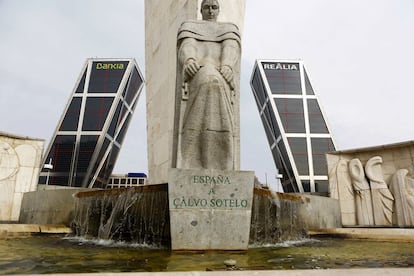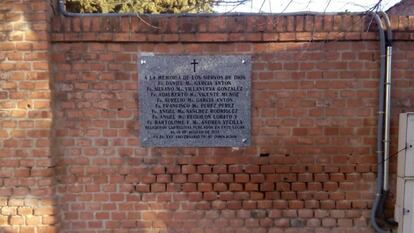Tearing down of Franco memorials sparks row between Madrid officials
City Hall says monuments must go because of ties to former dictatorship

Madrid City Hall’s decision to start tearing down monuments it associates with the Franco dictatorship has sparked a confrontation between the leftist municipal council and the conservative regional government.
The escalating face-off includes threats of legal action and calls for resignations.
On the same day that city workers took down a 1960 memorial to army officials located in the Jerónimos neighborhood, the regional government of Cristina Cifuentes, of the Popular Party (PP), announced an investigation that could lead to a penalty for local officials.
Priest: they could have told me

Regional premier Cristina Cifuentes said the way the city removed the plaque to eight executed friars at Carabanchel cemetery was “intolerable.”
Father Alberto, the parish priest at the Church of Saint Sebastian Martyr, where the memorial was located, said he found out that it was being taken away when a cemetery worker “discovered some municipal workers loading it onto a van.”
“They did it without consent or even informing us about it,” adds the priest. “I don’t know whether the law mandated its removal, but I think at the very least they should have let me know about it.”
The plaque was returned to its place on Wednesday morning.
Regional authorities say that the obelisk to the Alférez Provisional (a military rank equivalent to second lieutenant) enjoyed legal protection on two counts: first, because it was located along the Prado-Recoletos axis, which is an officially classed Asset of Cultural Interest, and secondly because of its position next to a landmark building, the Casón del Buen Retiro.
The case could lead to a formal complaint with the public prosecutor’s office.
City Hall has come back saying that the monument falls under “municipal ownership” and was not protected by heritage laws.
Meanwhile, PP councilors at Madrid City Hall have called for the resignation of culture commissioner Celia Mayer, of the leftist alliance Ahora Madrid, for taking down this and other historical monuments between Friday and Monday without warning other parties about it.
The deputy PP spokesman in the Madrid council, Íñigo Henríquez de Luna, said at a Wednesday press conference that both commissioner Mayer and Mayor Manuela Carmena have acted “with stealth and secretiveness” in this matter.
The conservatives even threatened to file a formal complaint against both women at a Madrid courthouse, but revoked their decision after the city announced that it would put back one of the memorials – a plaque to eight Carmelite friars who were executed by leftist forces in 1936, at the onset of the Spanish Civil War.
The plaque went back up at around 9.45am on Wednesday. But the PP said it may still consider legal action if the city continues to take down symbols without waiting for the action plan that the council agreed to draft in December.

It is also demanding the return of the Jerónimos obelisk and of a recently eliminated plaque to José García Vara, a right-wing unionist who was killed in an ambush in 1935. The city has also revealed plans to do away with five other memorials, including two in honor of José Calvo Sotelo, a right-wing deputy who was killed in 1936 by members of the Republican Assault Guard.
The conservatives note that all these symbols allude to events prior to the Franco era, and thus “do not violate the Historical Memory Law.”
No prior warning
Other opposition groups have also voiced concern over the way Carmena’s team has handled the issue.
“You can’t just take down monuments like this, regardless of whether you like them or not,” said Mar Espinar, the Socialist spokeswoman for cultural affairs.
Her counterpart at Ciudadanos, Sofía Miranda, said that “laws are there to be observed. We never agreed to remove these monuments at a plenary session, as Mayer now claims.”
Miranda also wondered why the city paid €17,999 to a university chair for an as-yet unpublished report on the matter, “if Mayer now says that the monument removal is based on a 2013 report justifying the move.”
When Ahora Madrid successfully took over the city council from the long-ruling PP after the May 2015 elections, one of its promises was to eliminate all “Francoist vestiges” from the city streets, in compliance with the Historical Memory Law that Congress passed in 2007, under the Socialist administration of ex-Prime Minister José Luis Rodríguez Zapatero.
In a plenary session held in December, the council had agreed to draw up a plan in the space of four months to address the issue of what to do with Francoist vestiges in the city. There is also a project in the pipeline to change around 30 street names with links to the regime.
English version by Susana Urra.
Tu suscripción se está usando en otro dispositivo
¿Quieres añadir otro usuario a tu suscripción?
Si continúas leyendo en este dispositivo, no se podrá leer en el otro.
FlechaTu suscripción se está usando en otro dispositivo y solo puedes acceder a EL PAÍS desde un dispositivo a la vez.
Si quieres compartir tu cuenta, cambia tu suscripción a la modalidad Premium, así podrás añadir otro usuario. Cada uno accederá con su propia cuenta de email, lo que os permitirá personalizar vuestra experiencia en EL PAÍS.
¿Tienes una suscripción de empresa? Accede aquí para contratar más cuentas.
En el caso de no saber quién está usando tu cuenta, te recomendamos cambiar tu contraseña aquí.
Si decides continuar compartiendo tu cuenta, este mensaje se mostrará en tu dispositivo y en el de la otra persona que está usando tu cuenta de forma indefinida, afectando a tu experiencia de lectura. Puedes consultar aquí los términos y condiciones de la suscripción digital.








































